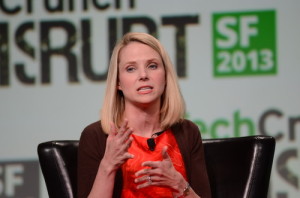The CEOs of Yahoo and Facebook were each on the hot seat Wednesday answering questions about the U.S. government’s data surveillance programs.

Yahoo CEO Marissa Mayer, in an on-stage interview at the TechCrunch Disrupt conference in San Francisco, said she couldn’t say more about the programs than Yahoo already has because doing so could be “treason.”
“We can’t talk about these things because they’re classified,” she said.
Pressed by TechCrunch founder Michael Arrington about what would happen if she revealed details about the government’s data requests, Mayer said she could go to prison.
“It makes sense for us to work within the system,” she said. For Yahoo, Mayer said, that means examining each request it receives and pushing back if it seems unreasonable.
In a separate interview, Facebook CEO Mark Zuckerberg was more outspoken. The U.S. government “blew it” by not communicating better about its surveillance efforts and made it harder for U.S. Internet firms to do business overseas, he said.
“It’s our government’s job to protect all of us, and also to protect our freedom and the economy, and I think they did a bad job of balancing those things,” Zuckerberg said.
“I think the government blew it,” he said.
The U.S. government, when asked about the surveillance programs, has said it was not spying on American citizens, Zuckerberg noted. That wasn’t helpful to Internet companies that do business overseas, he said.
“I think that was really bad.”
Both executives highlighted their efforts to push for greater transparency, and both said their goal is to protect their users. Both companies, along with Google and Microsoft, have filed lawsuits to force the government to let them disclose how many national security-related data requests they receive.
Those efforts have so far been unsuccessful. Earlier this week, the companies asked again for permission to provide more information about the data requests.
The latest round of leaks revealing U.S. government surveillance programs, including a data collection program known as Prism, were published in June by the Guardian and The Washington Post.
Since then, tech firms have come under scrutiny for the extent of their involvement with the government programs, and to what extent they have cooperated. They have all said they have cooperated only to the extent they are required to legally.





